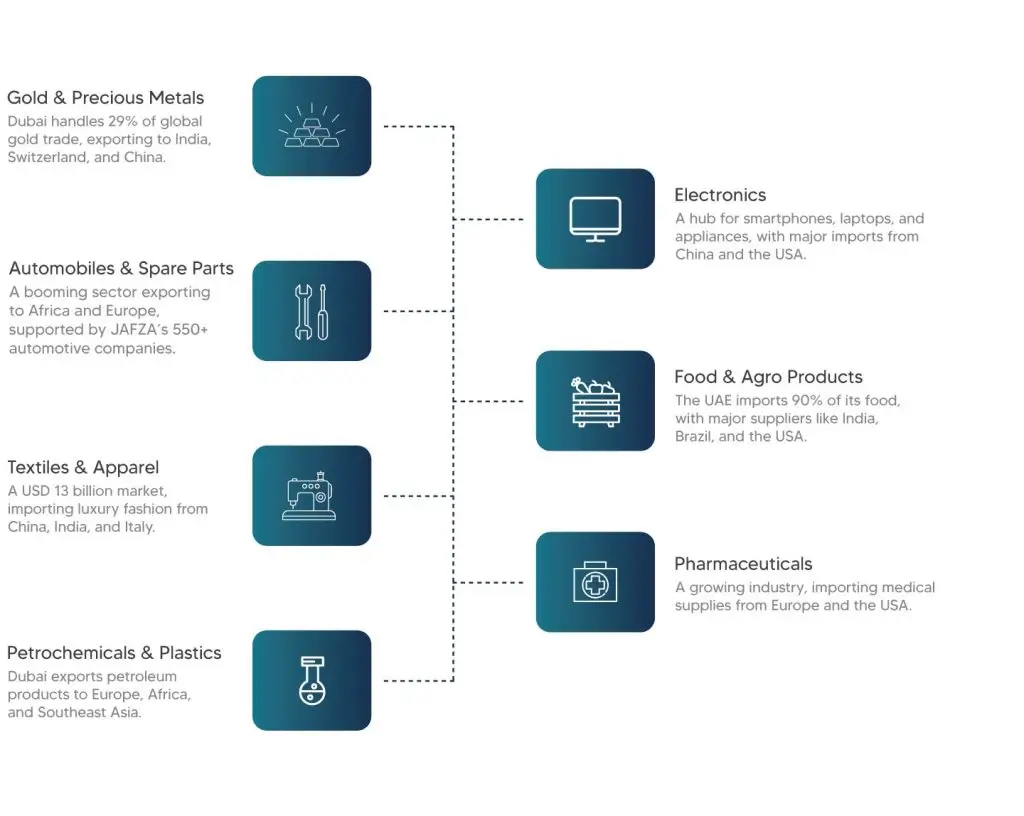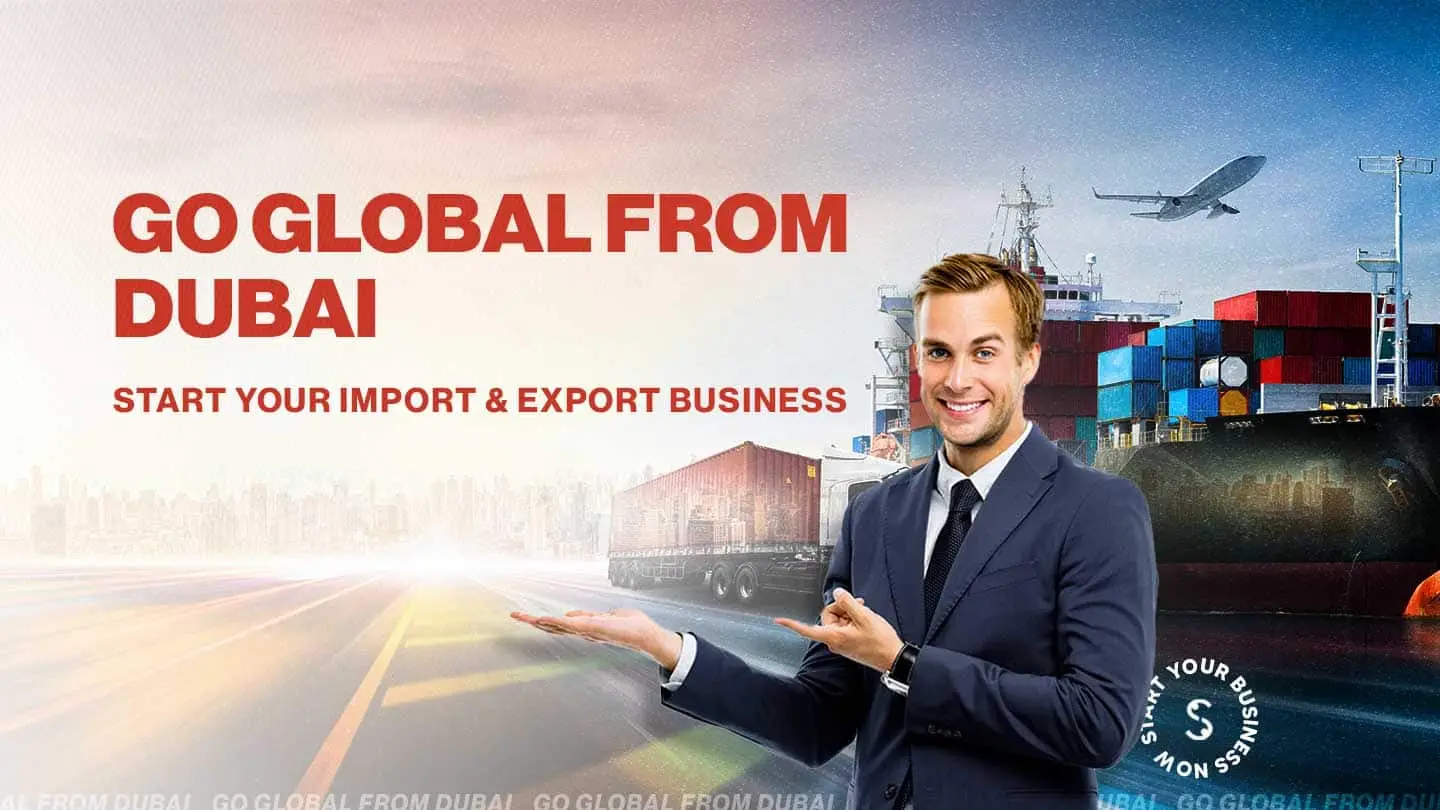Dubai is one of the best places in the world to start an import-export business. Thanks to its strategic location between Europe, Asia, and Africa, it serves as a global trading hub. With over $1.4 trillion in non-oil trade in 2023, Dubai continues to grow as a key player in international business.
The city boasts world-class infrastructure, including Jebel Ali Port, the busiest port in the Middle East, and premier airports that ensure rapid and efficient shipping of goods. Furthermore, Dubai’s business-friendly policies, tax advantages, and free trade agreements enable businesses to operate seamlessly and profitably.
The import-export business in Dubai is a major contributor to the economy, covering industries like electronics, automobiles, food products, textiles, and more. Whether you want to import goods into the UAE or export them to international markets, Dubai offers endless opportunities to grow your business.
- What is the import-export business in Dubai?
- Key Sectors for Import-Export in Dubai
- Benefits of Starting an Import-Export Business in Dubai, UAE
- Import Export License in the UAE
- How to Start an Import-Export Business in Dubai, UAE?
- Documents Required for Starting an Import-Export Business in Dubai
- What is the cost of an import-export license in Dubai, UAE?
- Why Choose Shuraa for Your Import-Export Business in UAE?
- Frequently Asked Questions
What is the import-export business in Dubai?
An import-export business in Dubai involves buying goods from one country (import) and selling them to another (export). Anyone, including foreign investors, entrepreneurs, and businesses, can set up an import-export company in Dubai. With 100% foreign ownership options, low taxes, and strong government support, starting this business is easier than in many other countries.
Key Sectors for Import-Export in Dubai
Dubai’s import-export business thrives due to its strategic location, tax-free zones, and strong global trade connections. Here are the top sectors:

Gold & Precious Metals—Dubai handles 29% of global gold trade, exporting to India, Switzerland, and China.
Electronics form a major hub in Dubai, including smartphones, laptops, and appliances, with significant imports coming from China and the USA.
Automobiles & Spare Parts—A booming sector exporting to Africa and Europe, supported by JAFZA’s 550+ automotive companies.
Food & Agro Products—The UAE imports 90% of its food, with major suppliers like India, Brazil, and the USA.
The textiles and apparel sector represents a USD 13 billion market, predominantly importing luxury fashion from China, India, and Italy.
The pharmaceuticals industry is a growing sector, importing medical supplies primarily from Europe and the USA.
Petrochemicals & Plastics—Dubai exports petroleum products to Europe, Africa, and Southeast Asia.
Benefits of Starting an Import-Export Business in Dubai, UAE
Dubai is a global business hub that offers unmatched advantages for entrepreneurs looking to start an import-export business. Here are some key benefits:
1. Strategic Location
Dubai’s strategic position at the intersection of Europe, Asia, and Africa positions it as a prime gateway for global commerce. This location offers businesses unparalleled access to a consumer base of over 2.5 billion people, facilitating effortless expansion and outreach.
2. Free Zones with 100% Foreign Ownership
Entrepreneurs can set up their business in one of Dubai’s many free zones, such as IFZA (International Free Zone Authority), JAFZA (Jebel Ali Free Zone), and DMCC (Dubai Multi Commodities Centre). These zones offer 100% foreign ownership, zero import/export duties, and full repatriation of profits.
3. Growing Trade Market
Dubai’s non-oil foreign trade reached over $1.4 trillion in 2023, showing steady growth. With increasing global demand for electronics, automobiles, textiles, and food products, businesses in the import-export sector have a huge opportunity to thrive.
4. Free Trade Agreements
The UAE has free trade agreements with numerous countries, reducing trade barriers and import duties. This makes it more affordable to import and export goods.
5. Easy Business Setup Process
Setting up a Dubai import-export business is straightforward, with minimal paperwork and quick approvals. Entrepreneurs can get their import and export license in Dubai in just a few days.
6. Favourable Tax Policies
Dubai offers 0% personal and corporate tax in free zones, making it an attractive destination for businesses. Even in the mainland, corporate tax is only applicable above a certain profit threshold, keeping the tax burden low.
Import Export License in the UAE
To start a Dubai import-export business, you need the right trade license based on your business activities. The Department of Economy and Tourism (DET) in Dubai issues these licenses for mainland businesses, while free zone authorities provide licenses for companies operating in free zones. Here are the key licenses required:
General Trading License
A general trading license is the best option if you want to trade multiple products across different categories, such as electronics, textiles, food products, and automobile parts. This license allows you to import, export, distribute, and re-export goods in and outside the UAE.
Free Zone License
If you want 100% foreign ownership, tax benefits, and zero customs duty, you can apply for a Free Zone Trade License in zones like JAFZA, DMCC, or Dubai South.
E-commerce License
If you plan to import products and sell them online in the UAE or internationally, an e-commerce license is required. This license allows businesses to trade via online platforms, marketplaces, and websites.
Import/Export Code
Once you have the trade license, you’ll need to register with the UAE Federal Customs Authority or the relevant customs authority in your emirate (e.g., Dubai Customs) to obtain an Import/Export Code (also known as a Customs Code). This code is mandatory for clearing shipments through customs.
How to Start an Import-Export Business in Dubai, UAE?
Obtaining an import and export license in Dubai is a straightforward process, though there are a few choices to consider depending on your business setup.
Here are the steps to start an import-export business in Dubai:
1. Decide Your Business Activity
The first step is to define your business scope. Choose the type of goods you want to trade—whether it’s electronics, food products, textiles, automobiles, or industrial equipment. This will help determine the right business license for you.
2. Choose a Business Location (Mainland or Free Zone)
There are two main options for import/export businesses in Dubai:
- Dubai Mainland: This is the most traditional business area. You’ll register your company with the Department of Economic Development (DED) and obtain a trading license.
- Free Zone: Dubai offers several Free Zones, each with its own set of rules and benefits. These zones often cater to specific industries and may offer tax breaks and other incentives.
3. Register Your Business Name
Choose a unique and compliant trade name and register it with DET or the respective free zone authority. Avoid using restricted words related to religion or government entities.
4. Obtain an Import-Export License
Apply for a trade license that authorises import and export activities. This usually involves the DED or your chosen free zone authority. You’ll need to specify the products you intend to import and export.
5. Register with Dubai Customs & Obtain an Import-Export Code
To import or export goods legally, register with Dubai Customs and obtain an Import-Export Code (IEC). This allows you to:
- Clear goods at Dubai’s seaports, airports, and land borders.
- Access customs duty exemptions in free zones.
- Apply for trade licenses related to restricted goods (e.g., pharmaceuticals, chemicals).
All import-export businesses must register through the Dubai Trade Portal as part of the mandatory customs registration process.
6. Apply for Residence Visa and Employee Sponsorship
Once you register your company, you can apply for residence visas for yourself, your employees, and your dependents. The number of visas you can obtain depends on your office size and business type. Free zone companies often receive a visa package with their license.
7. Secure Office Space & Warehouse Facilities
Mainland businesses need to rent a physical office in Dubai. Free zone companies can choose from flexible office solutions, co-working spaces, or even virtual offices. If you plan to store goods, you may need a warehouse facility (available in JAFZA, Dubai South, and DMCC).
8. Open a Corporate Bank Account
To facilitate international transactions, open a business bank account in Dubai. Choose a bank that supports global trade financing and offers multi-currency transactions.
9. Comply with Tax and Regulatory Requirements
Register for VAT (if annual turnover exceeds AED 375,000). The standard VAT rate in the UAE is 5% (some import-export activities may be zero-rated or exempt). Obtain any special approvals if dealing with restricted goods like pharmaceuticals or chemicals.
Documents Required for Starting an Import-Export Business in Dubai
The specific documents required to get an import-export trading license can vary depending on your jurisdiction. However, some general documents are typically required in most places:
- Trade name options
- Business activity
- Passport copies of all the shareholders
- UAE residence visa copy of the partner(s)
- Copy of entry stamp or visa page if the partner is on a visit visa
- Passport copy and Emirates ID of local sponsor
- The application process for the Import Export Code (IEC) may vary depending on the country.
What is the cost of an import-export license in Dubai, UAE?
The import-export license cost in Dubai starts from AED 25,500 onwards. This includes the general trading license fee, virtual office contract, application form, and import-export code (IEC) registration fee.
The total cost may vary depending on whether you choose a Mainland or Free Zone setup, the number of visas required, and additional services like customs registration or warehouse rental. Opting for a free zone license can offer lower costs and tax benefits, while a mainland license provides more flexibility to trade across the UAE and internationally.
Below are the other Emirates cost details.
- Sharjah: The cost of an import-export license in Sharjah will be around AED 23,000 onwards.
- Ajman: The cost of an import-export license in Ajman will be AED 24,000 (approx.).
- Ras Al Khaimah: The cost of an import-export license in Ras Al Khaimah will be AED 20,000 (approx.).
Note that these figures discussed for Dubai import-export license fees are estimated values and may vary. We highly recommend getting in touch with business setup experts at Shuraa for accurate import-export license costs in the UAE.
Why Choose Shuraa for Your Import-Export Business in UAE?
Starting an import-export business in Dubai is easier than you think. To start, you must secure the appropriate import-export trade license, register with customs, and open a bank account. At Shuraa Business Setup, we have 23+ years of experience helping entrepreneurs like you set up their businesses quickly and hassle-free. From paperwork to legal compliance, we handle it all. Get in touch with us today and start your import-export journey with ease.
Book a free consultation with our experts at +971 44081900 and learn more about the import-export license cost in Dubai, UAE. You can also send a WhatsApp message at +971 50 777 5554. For email assistance, mail your query to [email protected].
Frequently Asked Questions
1. How to start an import-export business in Dubai?
To start an import-export business in Dubai, follow these steps:u003cbru003eu003cbru003e1. Choose between a mainland or free zone business setup.u003cbru003e2. Apply for an import-export trade license from the DED or a Free Zone Authority.u003cbru003e3. Register with Dubai Customs to get an Importer Exporter Code (IEC).u003cbru003e4. Set up a corporate bank account and arrange logistics for smooth operations.u003cbru003e
2. How can you obtain an import license in the UAE?
To get an import license in the UAE, you need to:u003cbru003eu003cbru003e1. Apply for a general trading or commercial license from the relevant authority.u003cbru003e2. Obtain an Importer Code from Dubai Customs.u003cbru003e3. Register your business with the Dubai Chamber of Commerce.u003cbru003e4. Submit required documents like your business plan, passport copies, and visa.
3. How much does it cost to start an import-export business in Dubai?
The cost of an import-export business in Dubai starts from AED 25,500 onwards for the trade license. However, the overall initial investment could range from AED 50,000 to AED 100,000 or more, depending on factors like office space, warehouse requirements, customs registration, and logistics expenses.
4. Can I import and export any type of goods in Dubai?
No, some goods require special approvals. Restricted items include pharmaceuticals, chemicals, alcohol, tobacco, and electronic devices, which may require permits from authorities like Dubai Municipality, MOH, or TRA.
5. Do I need a visa to start an import-export business in Dubai?
If you plan to live and operate your business in Dubai, you will need a residency visa. When you establish a company, you can apply for an investor visa or employment visa for yourself and your employees. However, if you are setting up a business remotely, you may not need a visa.
*Please note that the information provided in this post is for general informational purposes only and may be subject to changes due to updates in government policies and regulations.














